Childhood Fears Age by Age: What Scares Preschoolers?

Your child is almost about that age for preschool and you are hoping your child is ready to spend a few hours away from you without too much anxiety. What is it that really scares our precious little preschoolers? Why are some more confident than others? There is a simple answer, children are only human and each one has a unique personality. Each person has one unique gene that no one else has. This is what makes us all different. Sometimes we wonder what are they thinking and how can we help them to overcome these fears? One thing we understand is that our preschoolers need to feel secure and need their rest, along with a healthy lifestyle. Home is the most important place your preschooler needs to feel secure. Do you ever wonder why your child shies away from men and loves women. Some children shy away from women and love the voice of a man. Some children recognize faces as young as a few months old and are fearful of a babysitter. Here are some of the top fears of preschoolers.
The Dark:
The majority of children are afraid of the dark at one point or another in their young lives. This is a very common fear because it’s fear of the unknown. You can help your child overcome this fear by leaving a small light on in their room. This can be as simple as a nightlight or a small lamp with a soft light bulb for comfort. You can also use some lavender and chamomile scents to soothe your preschooler. You can buy small Scentsy-tins with the scent included in the tin. This way you don’t have to worry about a scent burner possibly starting a fire in your house. You can also make DIY projects like Scentsy bags with lavender and chamomile and place around their room for a soothing effect. Remember to allow your child to control the amount of light they have on in their room. You can also take your child on a night walk with you so they can learn about all the exciting planets and stars that are out at night along with the moon.
Monsters:
Have you noticed your preschooler start to look under the bed or in dark closets? Suddenly, they ask you about monsters and believe they live under the bed and in all the closets and cupboards. One of the most interesting things about preschoolers is they have the most fascinating imaginations. They can conjure up monsters just about anywhere including outdoors as well. Remember this is the time you have to take these concerns seriously to prevent monster visits scaring your child. Take your child by the hand and check all the places your child feels a monster might visit and tell your child it’s time you and your child create a monster spray to spray the areas that your child believes the monsters lurk. You can use any spray bottle and fill it with food coloring of your child’s choice and let your child be in the driver’s seat. In addition, you can always have your child draw a picture and help them write “No Monsters Allowed”, and pin it on their door. This ought to solve the problem.
Storms:
Everyone at one time or another no matter what age you are can be fearful of thunder, lightning, tornadoes, and hurricanes. It’s the same with your preschoolers, they too are afraid at times of those loud thunder boomers. The best way to tackle this problem is to have your child become used to the different types of weather in your area. Take your preschooler to the park in all types of weather. Sit down with your child and create a weather chart so your child can actually understand what each day will bring. Felt boards are usually fun to work with. There are many different types of feeling to put on each day of the week from a sun to lightning bolts to raindrops and umbrellas. Most children’s craft stores or teacher’s learning centers carry felt boards. You can also find them online. Once you develop some kind of difficult weather plan along with a good weather plan as a family, your child will feel more in control.
Bad Dreams:
We as adults understand bad dreams and dreams that are good. Preschoolers, on the other hand, have problems understanding bad dreams because they can not yet distinguish reality and non-reality during their sleeping time. Some toddlers can’t tell you about their bad dreams but you might notice a change in their behavior. This may include frequent waking, screaming and crying, babbling incoherently about pictures they saw or fighting going to sleep. Remember you can always comfort your child with a favorite blanket or animal when they go to sleep. Cuddle your child and reassure them that they are safe and you will always be there. If your preschooler continues to have terrible nightmares that appear to be really intense, by all means, talk to your doctor. Your child might be experiencing the night terrors.
Strangers:
Now we are entering another phase with our preschooler which is fear of strangers. This type of fear is healthy and a protective fear and in all reality, you don’t want your child running up to a stranger they don’t know. It’s a bit difficult when family comes that your child doesn’t see often and grandma and grandpa want to snuggle your child and off they go crying. You should always give your child time to know someone before expecting them to interact or be friendly. Always remember to stand by your child’s side when your child is around strange and new people and set an example. Be polite and teach them about friendly interactions. You may also warn friends and relatives that your child doesn’t see often that it might take a bit for your child to warm up to them. You will find most people will be very understanding about your child’s shyness and tiny fears. You can also tell your company about your child’s favorite activities so they can use something they have in common to break the ice.
Separations:
Most small children think you are never coming back once you leave them. They cry and scream and you feel terrible. This is normal for young children to become anxious when their parents’ leave. Make sure you develop a healthy routine when you are about ready to leave and always leave your child with a trusted caretaker. Make your goodbye routine brief but make sure you use the same routine every time you leave. It’s not a good idea just to sneak away because this doesn’t give your child the reassurance that you are coming back. Once you leave, don’t go back until you are ready because you might just disrupt your child’s transition.
Being Alone:
Try to teach your child independence at a young age so they are not always clinging on you. You as a parent want your preschooler to learn how to play and be alone in their own house and of course, make sure you are close by. You can make a game out of this to help your preschooler adjust. You can both sit in separate rooms but make sure your child can see you. Take turns being alone and be vocal about this. You can start doing this using small amounts of time and longer amounts of time as your child becomes less upset about being a bit farther away from you. You can start at short periods of maybe a minute and work up to a comfortable time allotment but always remember never leave your child completely alone in the house for any length of time.
Toilets and Bathrooms:
Face it toilets are big and the toilets are large and young children are afraid of falling in. Sometimes, they just would not prefer not to go to these bathrooms at all. Young children who are beginning to toilet train are afraid of the loud flushes, the water disappearing and the other mechanical functions of a bathroom. Show your preschooler how these potties work and teach them to have control with flushing the toilet. Let your child practice. You can give your child small bits of toilet paper to flush down the toilet. You can also create a secure way for your child to use the toilet. First, you have to determine whether your child is more comfortable with a kid’s potty or a regular toilet. Then you can determine if you need a step stool. This will help your child feel they have some control over the fear of falling.
Doctors and Dentists:
All preschoolers tend to have a fear of doctors and dentists because they associate this fear with pain. Doctors give shots, and so do dentists if your child needs dental work. If your child stops in their tracks at one of these offices, it’s because they are associating pain with this office. You can prepare your child in advance for their visit with the doctor or dentist. Talk about the type of procedures and remind your child that the doctor or dentist always has pretty cool rewards for being a good sport for cooperating. You can always read them a book in the office to create mindfulness and take their anxiety away for a bit. Remember to always stay with your child during any procedure and congratulate your child on being brave and their strong behavior after the procedure is over.







